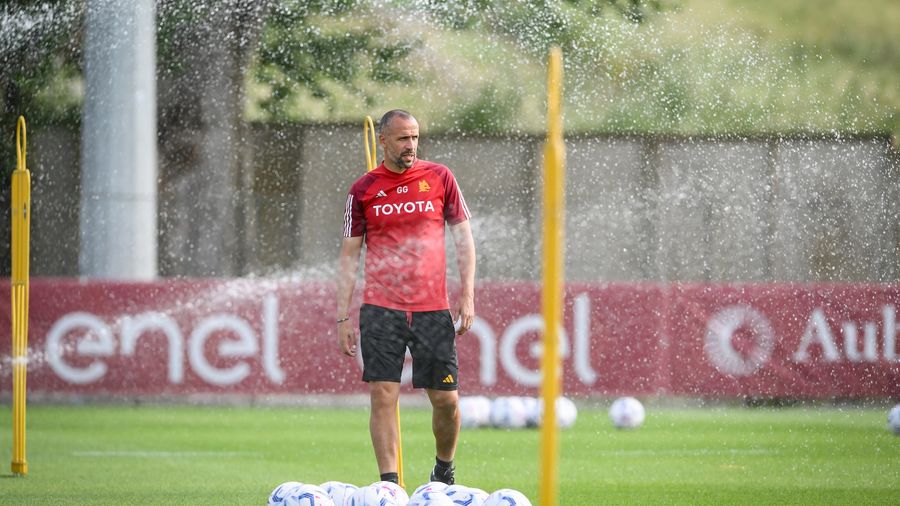

"Daniele and I met through our work in football, and it was immediately apparent that we shared different visions as coaches," notes Guillermo. During their playing days – as midfielders with different characteristics - they crossed paths on the pitch, but no more than that.
46-year-old Giacomazzi has a formidable CV. He racked up over 200 Serie A appearances - mainly for Lecce - was capped 17 times Uruguay and enjoyed a two-year spell at Penarol. "Penarol are a huge team in my country. The affection their fans show is akin to Roma fans".
In Rome he found a similar environment, in a city which can’t help but reel you in: “Every time I take a walk through the streets I feel how much people live for football. However, I don't get to visit Rome very often because we spend most of our time in Trigoria, preparing and planning our work".
Let’s start with this question: how much time do the coaching staff spend together, aside from on the training pitch?
"A lot. We deal with various matters - we review videos, we talk about what’s going well and what needs to be improved. We’re together until at least 8 pm, having met up in the morning, trying to leave no stone unturned. We have long meetings – sometimes they even last three hours – but it’s all a pleasure. After all, it’s football, we’re happy to be together, and it’s our passion."
Does working in a well-equipped and cutting-edge facility like the Fulvio Bernardini help even more?
"There’s no doubt that it does. We’ve got everything - the owners have made a truly all-round sports centre for the coaching staff and players. Personally, I have little in-depth experience from other clubs with which to draw parallels but having spoken to others who have worked elsewhere they have drawn the same conclusions. Dani himself played for Italy, travelled a lot, featured in World Cups, European Championships and other cups, and even played in Argentina. While he did this as a player, not as a coach, it’s all the same. We’re delighted to be at Trigoria."
And it’s precisely at Trigoria that you’ve kicked off the work for this coming season. What are your first impressions?
“This is the first time we’ve been able to work on the team from the beginning of the season, as last season we were brought in in January. The team has done a lot of work up to now. They’ve pushed really hard on the fitness side of things.
“When it comes to tactics, we’ve progressed gradually, considering that we didn’t have the whole group available. But we’re happy. Now we’ve got a big chunk of our players back, we can take care of some coaching aspects at our training camp in England.”
Going into detail, what do you bring to the coaching staff?
“Our method of working – at least at this stage – is that all of the staff prepare and work on the same things, as equals. Each of us have different characteristics, but there are no hierarchies. Daniele involves everyone. He listens attentively and then makes his assessments on what we should do.”
Other than the drills on the pitch that we’ve already touched upon, how much time do you dedicate to the psychological side of things? How important is that?
“I think it’s crucial, especially to earn the lads’ trust. I’ve been a footballer. All of the staff have been involved in this world in some way or another and at different levels, but it doesn’t change. Football has the same principles everywhere. We know how important it is to involve and talk to those who get less playing time. We also know how important it is to support the players when we lose a match.
“Daniele is very good in that respect. He’s got a backbone. He’s skilled not just tactically, but also in communication. As his staff, we need to approach certain situations with the right sensitivity to be able to understand them. We need to be able to give our two cents where needed, to raise our voice when necessary so we’ve got a cohesive group. It’s important that everyone’s heading in the same direction.”
In this regard, how are the new arrivals settling in?
“Very well. Beyond the unquestionable technical talent they have, they are all great lads from a human point of view too. That’s essential. They’re available, humble, and got down to work straight away. They’ve got talent and they want to learn.”
Throughout your footballing experience, is there a coach that made more of an impression on you than others?
“It’s easy to give the most obvious answer that I learnt a bit from everyone. That’s partly true, but it’s also inevitable that over such a long career you will meet people that leave more of a mark on you than others.”
So who was that for you?
“Daniel Passarella when he was coaching Uruguay. He brought with him his experience of being a star of the Argentina national team and his charisma. He managed to keep a tough group together, a group with lots of complex personalities. He was also great on the pitch, making the most out of his partnership with Alejandro Sabella. He’s a great man. You could compare Daniele De Rossi to him today.”

 Tickets
Tickets
 Shop
Shop


































